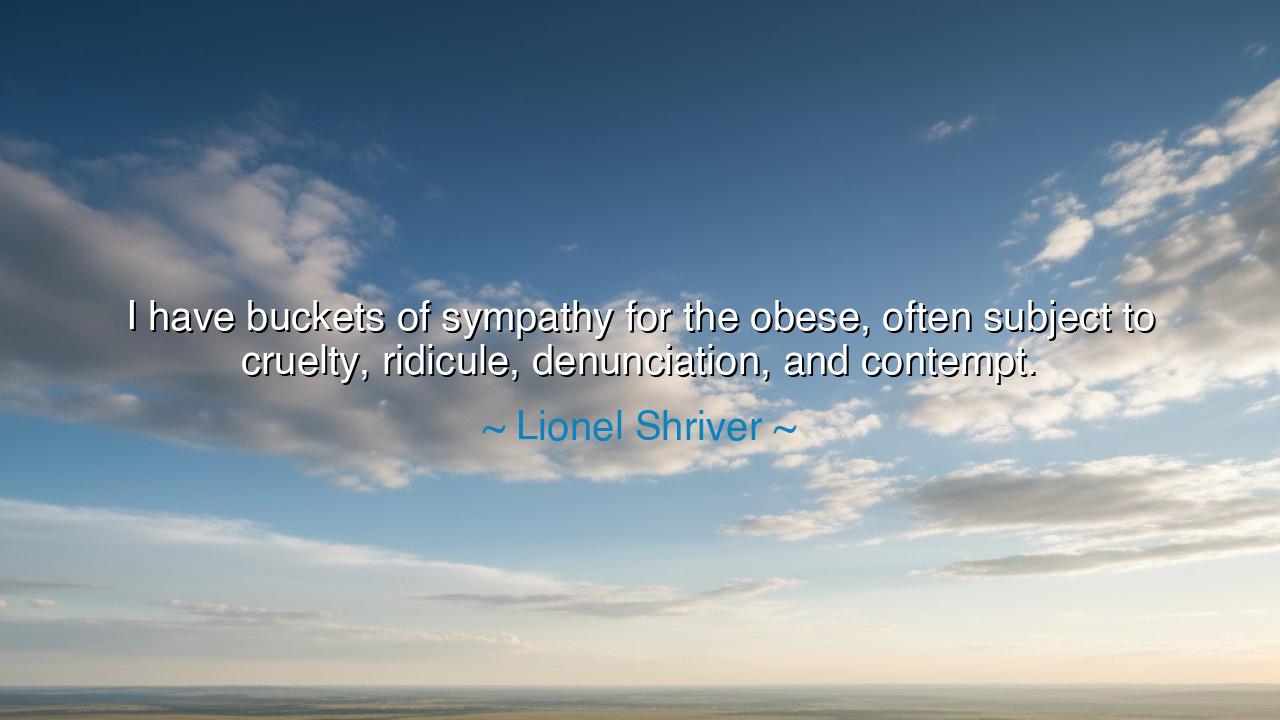
I have buckets of sympathy for the obese, often subject to
I have buckets of sympathy for the obese, often subject to cruelty, ridicule, denunciation, and contempt.






In the vast expanse of the human condition, there are few greater cruelties than the judgment passed upon those who, through no fault of their own, bear the weight of society’s disdain. Lionel Shriver’s words, "I have buckets of sympathy for the obese, often subject to cruelty, ridicule, denunciation, and contempt," are an invitation to gaze deeper into the hearts of those who are too often seen as lesser or undesirable. Obesity, once viewed with such harshness, carries with it an unjust burden—an invisible weight of judgment and scorn placed upon the shoulders of those who already carry their own personal struggles.
To understand the depth of this sympathy, we must first acknowledge the suffering that lies hidden beneath the surface. It is easy, in the midst of a world that celebrates thinness and perfection, to forget that the obese are not simply the sum of their bodies. They are complex, multifaceted beings, full of hopes, dreams, and fears like any other. Yet, they are often met with mockery—their struggles diminished, their worth reduced to something shallow, something superficial. History tells us that society has often cast out those who do not conform to its standards. Just as Hunchback of Notre Dame’s Quasimodo was burdened not only by his deformity but by the world’s rejection, so too are the obese cast aside, their humanity obscured by the cruel judgments of others.
In ancient Greece, the philosophers debated the nature of virtue and worth, often tying both to physical appearance. The ideal was embodied by the athletes of the Olympic Games, who celebrated both beauty and strength. However, the philosophers of that time also acknowledged the vast complexity of the human soul, recognizing that physicality alone does not determine one’s value. Yet still, the ancient world, like our own, held beauty and strength in high regard, often forgetting that the body is but one fleeting aspect of the human experience. The true measure of a person lies in their character, in their compassion, in their ability to rise above the superficial judgments of others.
Take the example of Queen Victoria, whose reign is marked not just by her political power but by her personal struggles with weight. Throughout her life, she faced public scrutiny and ridicule for her body. Yet, her reign was a beacon of strength, determination, and wisdom. She was a ruler who, despite the cruel remarks and judgment from her contemporaries, remained steadfast and committed to her duties. Her story reminds us that even those who face the most intense societal criticism can embody grace, dignity, and resilience. Queen Victoria's example is a powerful testament to the fact that humanity cannot be defined solely by physical appearance.
The lesson from Shriver’s words is profound: that we must look beyond the surface, beyond the body, to truly see the person. The obese are not weak or inferior; they are not to be reduced to their appearance or ridiculed for what they cannot change. Instead, they are deserving of compassion, understanding, and respect. In their struggle, they remind us of the very fragility of the human condition. Every one of us, regardless of size, is engaged in a battle—whether it be with society, with personal demons, or with the world’s expectations. The act of truly seeing another person, of offering sympathy instead of scorn, is an act of courage and humanity.
In today’s world, we are bombarded with messages that promote the perfect body, the ideal appearance. Yet, we must ask ourselves: what does this obsession with appearance truly cost us? The lesson here is clear: we must show empathy, acceptance, and love to those who are different from us. We must resist the temptation to judge others by their outward appearances and instead celebrate the diversity of the human experience. Shriver’s words compel us to reconsider our standards of beauty and to expand our vision of what it means to be whole.
Let us then offer sympathy where judgment prevails, and let us reach out with kindness instead of cruelty. As we journey through life, let us remember that no one should ever be reduced to a mere stereotype or seen as less than what they truly are. By doing so, we not only uplift others but also elevate our own humanity, learning that to show compassion is the truest form of strength.






AAdministratorAdministrator
Welcome, honored guests. Please leave a comment, we will respond soon